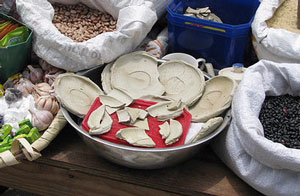Comment
How to Make Mud Cookies
A traditional Haitian remedy for hunger pangs could be a path to riches.
This article is from the July/August 2008 issue of Dollars & Sense: The Magazine of Economic Justice available at http://www.dollarsandsense.org

This article is from the July/August 2008 issue of Dollars & Sense magazine.
Subscribe Now
at a 30% discount.

Photo credit: Chuck Holton.
Mud cookies are all the rage in Haiti today—a rage sparked by soaring food prices. The cookies, a traditional remedy for hunger pangs and a source of calcium for pregnant women, have become a staple because food is simply unaffordable for impoverished Haitians. With food prices showing no signs of leveling off, more and more Haitians are likely to rely on the biscuits for their nutritional needs—and the rage is likely to grow.
The cookies are easy to make. The main ingredient, an edible clay from Haiti’s Central Plateau, is abundant, and salt and vegetable shortening are added in quantities that vary according to affordability. The cookies are then left out in the sun to bake. Besides being filling, they are dirt-cheap.
At least they have been up until now. The clay that is used to make the cookies is rapidly going up in price due to increasing demand. It now costs about five dollars to make 100 cookies, so even the “cookie jar” is out of reach of many Haitians, who make an average of about two dollars a day.
While it may seem that Haitians have reached rock bottom, they may, in fact, be sitting on a gold mine. Through the alchemy of comparative advantage, their sludge-filled biscuits could become their most valuable commodity, propel the country into the ranks of rich nations, and even provide a lasting solution to world hunger. After all, the logic of shifting more resources into the production of these biscuits is as “impeccable” as Lawrence Summers’ argument for moving dirty industries from rich to poor countries.
Think of it. Clever marketers could label the exported cookies “organic” and “low-cal.” Publicity campaigns could make favorable comparisons with Twinkies in terms of nutritive value without violating any truth-in-advertising regulations. Bakeries could diversify their offerings: mud pastries, mud quiches, mud rolls, mud scones, and so on. Franchising could be hugely lucrative. Soon, door-to-door deliveries of no-dough donuts could displace Dunkin’ Donuts’ delicacies. To steal market share from the famous franchise, marketers could mimic the name of the chain: how about “Muck-in-Donuts”? Sales experts from McDonald’s could be brought in to coach vendors on the correct way of saying, “Would you like flies with that?”
It’s a win-win situation, really. Haiti could climb out of poverty through increased export revenues, and businesses could even boost revenue by selling their carbon credits, since the baking process relies exclusively on solar energy. Production costs would subsequently come down, making the cookies more affordable.
If the IMF could then coax other Third World countries into producing their own varieties of mud cookies for export, the global supply of cookies would expand, and the price would drop even further. A cheap global supply of mud cookies would help to alleviate hunger throughout the global South. The United States would then be able to pare down its food aid to poor countries, freeing up money to spend on worthier pursuits, like bringing peace to Iraq. And, instead of handing out candies to Iraqi children, American soldiers could be distributing Haitian-made cookies, at a fraction of the cost.
Copyrighting the recipe would be unnecessary. Step-by-step instructions can easily be found in cookbooks such as Milton Friedman’s Capitalism and Freedom or Freidrich von Hayek’s The Road to Serfdom. An abridged version follows:
Start by pouring dollops of any cheap American grain—say, rice—into any poor country—say, Haiti. The imported grain should be heavily seasoned with subsidies from the U.S. government. While pocketing millions in subsidies, be sure to sing the praises of “free” trade, peppering your verses with denunciations of government interference in markets. If the intended importing country resists, turn up the heat, withholding crucial loans until its leader agrees to cut tariffs on American grain imports. The flood of cheap imports will undercut domestic grain production, push local farmers deeper into poverty, and make a formerly self-sufficient country dependent on grain imports. Check to make sure that enough bags of imported U.S. rice are labeled “foreign aid.” Reassure impoverished Haitian farmers with the old saying that expresses the great virtue of open markets: “A rising tide lifts all goats.”
To ensure Haitians get a balanced diet, you can add some “greens” in the form of grain-based biofuels, like ethanol. The biofuels should also be generously seasoned with subsidies from the U.S. government (this could also be followed by condemnations of the market distortions caused by government interference). Ramping up biofuel production will drive global food prices up even more. Fortunately, the mud cookie industry has been well established by now.
Sit back and watch as the Haitians simmer with rage. Don’t let the crisis boil over, though. If food riots erupt, toss in some troops with orders to crack open a few heads. After all, you can’t make an omelette without breaking eggs! To prevent the American public from getting squeamish at the sight of blood-filled streets in Haiti, get CNN to focus its attention on the Dalai Lama. Before long, a collective feeling of detachment will set in; images of a corpulent laughing Buddha will draw public attention away from the skeletons walking the streets of Cité Soleil. Eventually, the Caribbean pressure cooker will move to the back burner all by itself. Mud cookies will continue to sell like hotcakes.
Critics may start linking your recipe to rising food prices, so it is now time to blame out-of-control “Asian demand,” another way of saying the Chinese should not be eating as many hamburgers as North Americans. Then claim that bad weather and bad harvests have left the global food pantry practically empty. Ignore the fact that per capita consumption of beef in the United States is about seven times greater than China’s. Disregard the fact that half the rise in corn demand in the past three years has been due to ethanol production. Also overlook the Canadian government’s recent decision to pay hog farmers $50 million to kill 150,000 pigs in order to raise the price of pork. Trust us—there’s a real food shortage out there.
Don’t remove your apron just yet. Flip through the cookbook of the Michael Milken Culinary Institute, where you’ll find other “quick ’n easy dough” recipes. (The now-defunct institute, better known for cooking the books than for publishing cookbooks, remains an inspiration for many pinstriped pastry pros on Wall Street).
The main ingredient for fast dough—grain futures—can be purchased at any commodity futures exchange. You’ll need to buy huge quantities if you want to make lots of dough. But through leveraging, this shouldn’t be a problem—you’ll be using other people’s money. Leaven with the nostrums of laissez-faire and watch your mix turn into a soufflé. This is market efficiency working its magic.
As the soufflé inflates, global grain prices will swell, along with the bellies of Haitian children. But at least unemployment on the island will come down as bakeries add more shifts to meet the demand for their cookies. Ignore the accusations of speculation and price manipulation; what you are doing is greasing the markets, otherwise known as “hedging.” (You may want to use short(en)ing for grease, but only if you are sure the soufflé will deflate fairly soon.) To absolve yourself of any responsibility for escalating food costs, invoke “Asian demand” anew.
You can now pass the apron on to the head chef—U.S. agribusiness. The chef will assure the starving masses that only he can feed the world. Already bloated from subsidies, he will take advantage of government-granted monopolies—patent-protected genetically modified crops—to further tighten his grip over global food production. This he will do while delivering encomiums to unfettered markets.
Pay no attention to the epidemic of farmer suicides in India; they have nothing to do with the debt-inducing purchases of fertilizers and pesticides that must be used along with the costly patent-protected genetically modified seeds. Remind yourself that the subcontinent could become a huge market for Haiti’s cookies. If the price of the mud cookies subsequently begins to soar, you can blame “Asian demand” once again.
